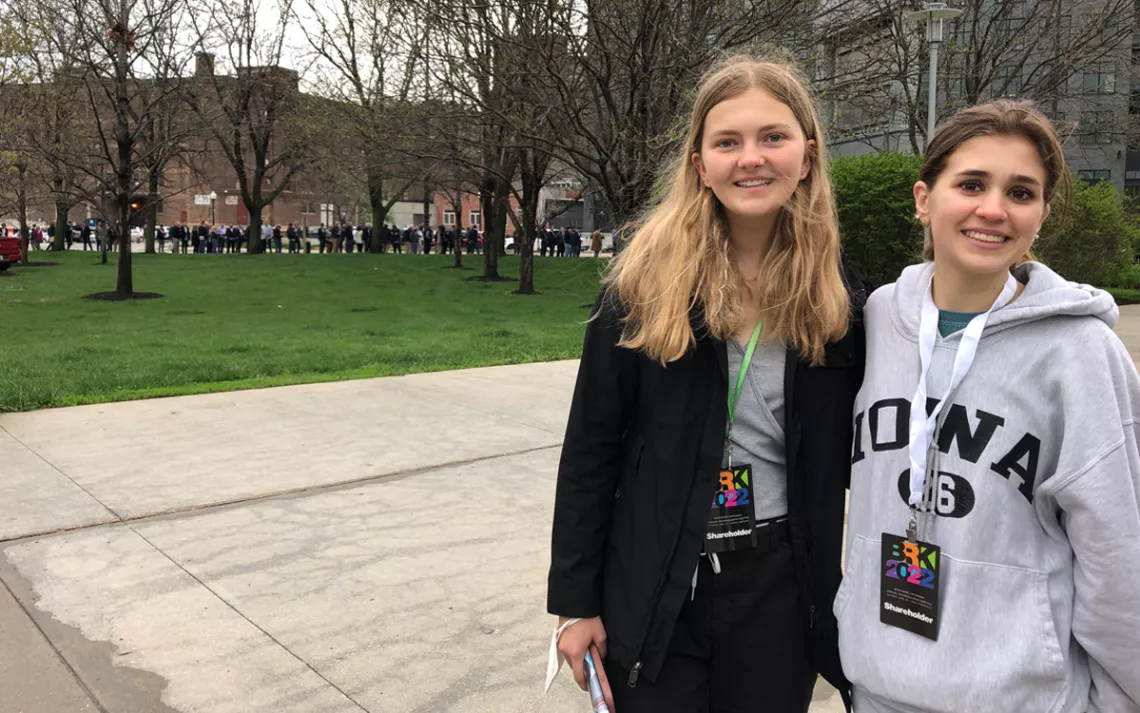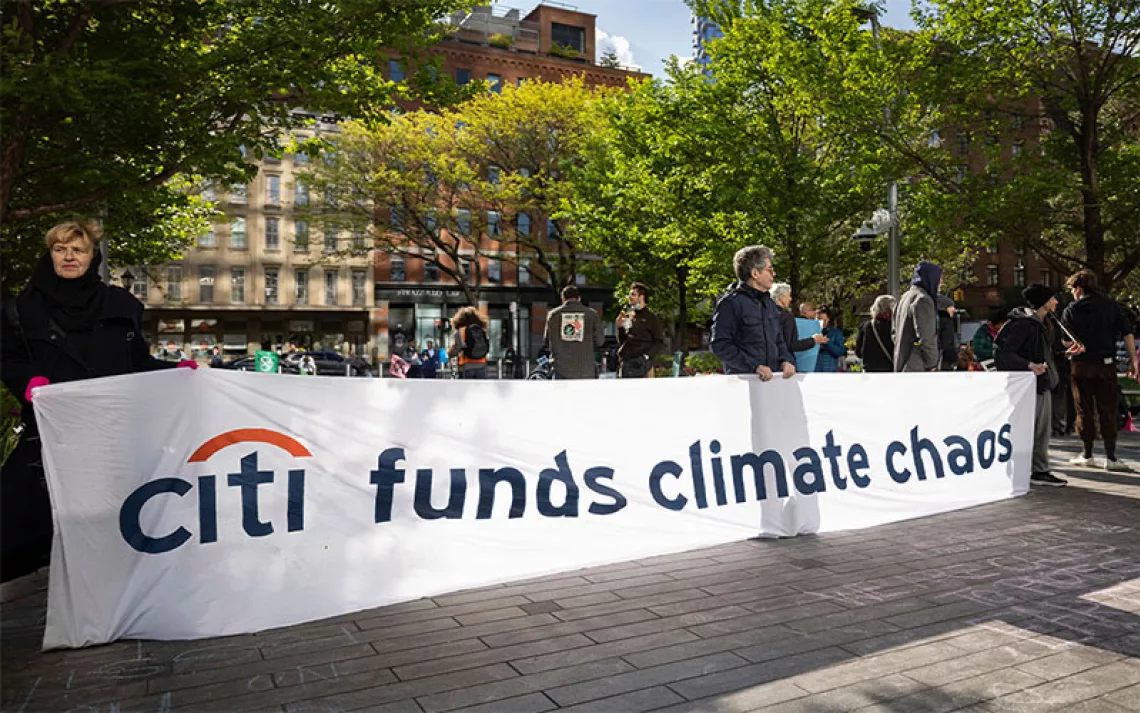Youth Versus Berkshire Hathaway
Two Iowa teens are using every tool at their disposal to push the investment giant to take climate change seriously

Photo courtesy of Emma Colman
What were you doing when you were 12 years old?
Were you hosting Zoom calls with someone of the stature of John Kerry, the US special presidential envoy for climate change, also a former US senator and secretary of state? How about when you were 16 years old? Did you take a meeting with the president of Berkshire Hathaway Energy—a meeting he suggested—to learn about the power grid and discuss your activism urging his multibillion-dollar company to shut down its coal-fired power plants in Iowa?
Probably not.
But then most of us aren’t as precocious as high school sophomore Hannah Hayes, 16, and eighth-grader Lillian Hill, 14, two students from the Des Moines area who, as early as third grade, began developing an ethical worldview about protecting the environment.
Most recently, the pair made news when they challenged Warren Buffett’s Berkshire Hathaway investment firm to cut its ties to five coal plants that, together, make up the largest source of carbon pollution in Iowa.
“I’ve met very few kids like Hannah and Lillian in or out of Iowa,” says Emma Colman, an organizing representative with the Sierra Club’s Beyond Coal campaign in Iowa. “So far, their ambition is unmatched. I think there are a lot of other activists that are interested and engaged and that show up consistently, but nobody has stepped up to lead in the way that Hannah and Lillian have. They are just undeterred.”
Lillian Hill credits her father, Charles, who works for the Iowa Civil Rights Commission, for helping cultivate her progressive ideals. “I heard of the climate crisis. And what caught my attention was that we were, like, in a huge, sixth mass extinction,” she says. “And so in third grade, I saw that animals were dying at an extreme rate, and I kind of got freaked out.”
Hannah Hayes’s political awakening came a little later in life, sometime in seventh grade, when a teacher explained the environmental dangers of plastic pollution. That led her to take an interest in recycling, before her grandfather, a retired dentist named Robert Anderson, sent her articles about the climate crisis. “I was like, ‘Oh, we have a bigger issue than just plastic.’”
Hayes eventually read about the Swedish climate activist Greta Thunberg and the youth-led organization Zero Hour. She went from signing online petitions to volunteering for the local Sierra Club. “I reached out to the Iowa Environmental Council and asked if they had anything for me to work on, and that’s what put me in touch with Lillian.”
The pair—separately and together—soon graduated from self-education and signing petitions to organizing and action. A lot of action.
By 2020, Hill had already cofounded the Johnston Climate Change Committee in her hometown along with former city council member Scott Syroka, who later went to work for the Biden administration. Today, that organization is in the process of developing a greenhouse gas emissions study for the community. In early 2022, Hill organized a series of climate strikes at the Iowa statehouse in Des Moines. Over the course of four months, attendance grew from around 30 people to more than 100.
According to Colman, “It was supposed to be students having students walk out of classes. But all these people were showing up before leaving work, or grandparents coming and supporting younger generations. She held them during the legislative sessions to really target legislators.”
Strikers marched, held colorful signs demanding climate action, and chanted outside. They also took their protest inside the state capitol rotunda, where some legislators watched from the balcony, but none came down to talk to the climate strikers. Legislative offices are on the second floor, and citizens cannot stop by their elected representatives’ offices without an appointment.
“They looked down on us when we were protesting in the rotunda with a grin on their faces,” says Hill. She feels that some of them think it is “silly” that a 14-year-old is leading climate strikes. “Even though I can’t vote, the legislature’s actions affect me as a person,” she says.
As the two young climate activists were lobbying Iowa officials to address global warming, they also began studying up on the state’s energy systems. They soon learned that the greatest source of carbon pollution in Iowa is five coal plants operated by MidAmerican Energy, which is a subsidiary of Berkshire Hathaway Energy, part of the conglomerate of companies owned by famed Omaha investor Buffett.
Every spring during the Berkshire Hathaway shareholder’s meeting—the so-called Woodstock for Capitalists—thousands of shareholders converge on the Nebraska city to listen to Buffett, the “Oracle of Omaha.”
Earlier this year, Colman casually mentioned to Hill that the Iowa Sierra Club was going to the 2022 shareholders' meeting to scope it out and strategize how the organization could “have a voice in it” in the future. Several shareholders had donated their tickets to give the activists a way to attend. Hill wanted to be part of it, and so did Hayes.
On the weekend of April 30, Hayes and Hill—each accompanied by a parent—caravanned from Des Moines to Omaha, along with two Sierra Club staffers and Brian Campbell, executive director of the Iowa Environmental Council. Hill and her father arrived at the convention center in downtown Omaha on Saturday morning at 6:30 a.m. for the 8 a.m. meeting. She says the line seemed about five blocks long, and they were three-quarters of the way back. It was the first in-person Berkshire Hathaway shareholders' meeting since the pandemic began two years before, and the crowd was energized.
Inside the arena, lyrics from popular songs were converted into Berkshire Hathaway–themed anthems. “Uptown Funk” became “Berkshire Funk.” “Welcome to New York,” a gritty piece of social commentary peppered with profanity featuring rapper Jay-Z, was also parodied. “I thought it was extremely weird,” says Hill.
One of the traditions of the annual meeting is that attendees get to craft questions for Buffett to answer. Hayes and Hill submitted the following question: “With enough investment in wind and renewables to soon meet Iowa’s energy needs, why hasn’t Berkshire Energy invested in our futures by making adequate retirement plans for your coal plants, which are currently Iowa’s biggest polluter and will continue to be until you finally retire them in 2049—when we’re both middle-aged?”
Miraculously, their question was one of the dozens drawn at random to be addressed by Buffett. But between his lengthy response on questions about the state of US politics, the risks and rewards of investing in China, and the value of cryptocurrencies (“I wouldn’t pay $25 for all of the Bitcoin in the world”), Buffett never got around to the young women’s question about renewables and coal.
Hayes and Hill then decided to pitch their question to Buffett via an op-ed in the Omaha World-Herald. In their article, Hayes and Hill chided the shareholders for sitting back and idolizing every word Buffett said while “young people across the country are fighting for all of our futures and for the science we know to be true.” They didn’t spare billionaire Buffett either, ending the op-ed with this thought:
“No matter how frequently young people plead for action, nothing can change until politicians and billionaires start treating climate change like the existential crisis it is. Young people have the voices, but we lack the resources, respect from elders and power to create swift change. The adults at the meeting do. They need to grow up, like us youth have been forced to do, and start acting like adults.”
Back in Des Moines, Hayes has used her privilege to try to reach out to Berkshire Hathaway Energy executives in a personal way. She lives in the same neighborhood as both Bill Fehrman, the president and CEO of Berkshire Hathaway Energy, and Greg Abel, a chairman of its board, who is slated to succeed Buffett when he retires. Once, she made cookies shaped and decorated like Earth and left a note about the climate crisis at Abel’s residence. She never heard back from him—though she did have one lengthy conversation with Fehrman during which they discussed climate change and what Berkshire Hathaway is doing to address the crisis.
The climate crisis has already impacted Hill’s family directly. Her grandparents lived in Marshalltown when a destructive derecho barreled through Iowa in 2020. They were getting their roof replaced at the time. Insulation blew into their house, making it impossible for them to live there. As low-income seniors who are retired, the insurance they could afford was inadequate to cover the damage, so they had to sell their home and move near Des Moines into a residential nursing home.
Hill is keenly aware that the climate crisis hits poor and marginalized communities hardest. “On my climate strikes I make sure we have a diverse group” of organizations represented, she says. Speakers have included the Sierra Club, Iowa Environmental Council, Women’s International League for Peace and Freedom, and Great Plains Action Society, an Indigenous-led organization. Hill feels that while climate change is everybody’s fight, “some voices need to be prioritized.”
Each of these young activists has big plans for the future. “I’ve considered going into environmental science or political science for my bachelor's and getting a JD in environmental law and then defending marginalized communities and BIPOC people through environmental justice,” Hill says. Hayes also contemplates a future law degree.
But for now, they are still in middle school and high school and busy with things like show choir, debate club, student government, tennis, mock trial, and, of course, the environmental student groups that they founded.
This summer, Hayes has a job working as a lifeguard at an outdoor pool. Hill doesn’t have a summer job because, as she says, “there’s limited options for a 14-year-old.” She may try to intern with a national or state political campaign.
They both plan to continue their climate activism—recruiting members for Hill’s new youth climate leadership group, organizing a protest at the Iowa Utilities Board, participating in a climate justice mural downtown, and circulating petitions to shut down Iowa’s coal plants.
You know—kid stuff.
This article has been updated since publication.
 The Magazine of The Sierra Club
The Magazine of The Sierra Club



